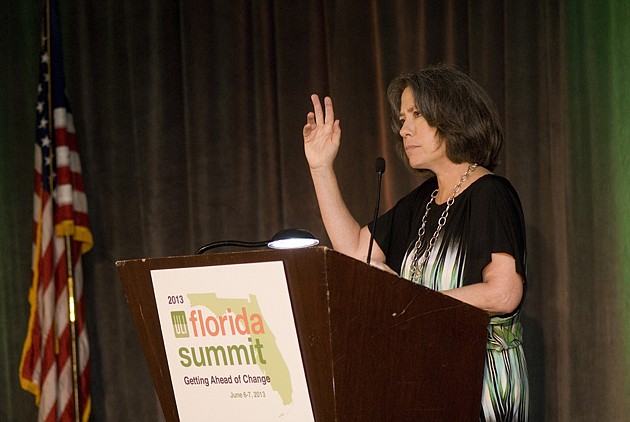- November 27, 2024
-
-
Loading

Loading

Two sessions on capital at a recent real estate conference in Naples presented stark contrasts.
It was standing-room-only at a capital markets breakout session of the Urban Land Institute's Florida Summit, where bankers, investors and developers cheered the flood of money rushing into commercial real estate and development.
Later the same day, former Federal Deposit Insurance Corp. Chairwoman Sheila Bair spoke to a half-empty room as she warned of another real estate bubble and bemoaned the lack of regulation of the real estate securities that helped derail the economy.
In the capital-markets session, a panel of industry insiders noted investors are flooding back into commercial real estate, chasing higher yields than those of alternative investments such as government bonds. This bodes well for owners and developers of apartments, shopping centers, warehouses and office buildings around Florida who need financing.
“Five years ago, this conference would have been a very sad place,” says Manuel de Zarraga, executive managing director of HFF in Miami, a firm that specializes in commercial real estate financing.
“The amount of capital and how quickly it flowed back was a surprise,” says Rocco Ferrara, chief investment officer for Stiles, a Fort Lauderdale-based commercial developer.
There are now queues to get into commercial real estate funds that invest in top-quality buildings, says Robert Plumb, managing director of AEW Capital Management, a money management firm with $26 billion in real estate assets and securities under management for institutional and private investors.
While interest rates have been rising, they're still at historic lows, Plumb says. “It's still basically free money,” he says. “Everyone's chasing yield and everyone is thinking safety.”
Demographics continue to favor Florida, particularly as northerners gain the ability to sell their homes in northern states. “You don't appreciate the pent-up demand to move to Florida,” says Plumb. Demand for housing will create demand for shopping centers, warehouses and offices.
Following the capital-markets session, Bair addressed many of the same issues but expressed concerns that the Federal Reserve's monetary easing is fueling real estate like it did before the crash. “We've hardly done anything in Washington five years after the crisis,” Bair complains.
Bair warned that the surge in capital chasing real estate is sowing the seeds for another real estate boom and bust. “South Florida is starting to look a bit frothy,” she says.
Bair says she favors boosting capital requirements for lenders because of what she considers a worrisome increase in risky lending. “We're starting to see a lot of the same behaviors we saw before the crisis,” she says. “Those capital requirements need to go higher.”
Bair says she's particularly concerned about the securitization of commercial real estate, in which financial firms sold securities tied to risky real estate to investors who thought they were buying safe investments. “The main cause of this crisis was greed,” she says.